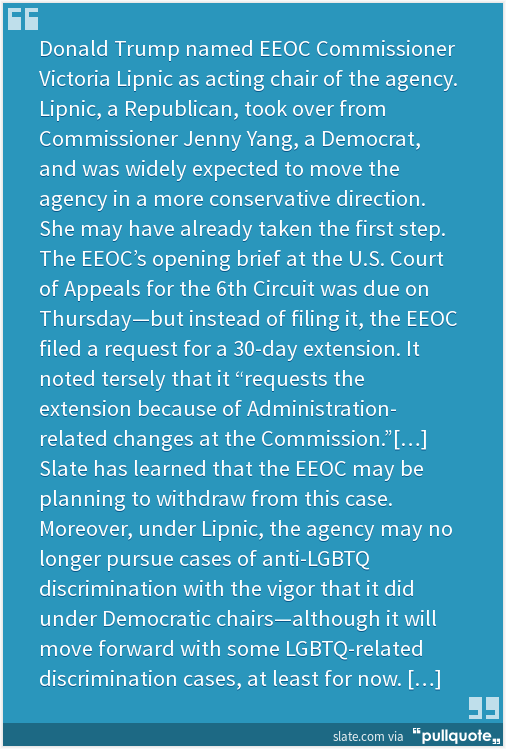Search
Has the EEOC found religion on LGBT workplace discrimination?
In a transgender-bias case with an employer-defendant concerned about having to violate its sincerely-held religious beliefs, the employee informed a federal appellate court last week that she is “reasonably concerned that the EEOC may no longer adequately represent her interests going forward.”
Wow! Wow! WOW!!!
“EEOC Sues Detroit Funeral Home Chain for Sex Discrimination Against Transgender Employee”
That was the headline from this September 2014 U.S. Equal Employment Opportunity Commission press release.
The transgender employee, Aimee Stephens, had worked for R.G. & G.R. Harris Funeral Homes. The EEOC sued Harris Funeral Homes on Ms. Stephens’ behalf under Title VII of the Civil Rights Act of 1964, alleging that Harris Funeral Homes discriminated against Ms. Stephens because she is transgender. According to the EEOC’s prior holding in Macy v. Holder, that amounts to discrimination based on sex.
When Hobby Lobby trumps LGBT rights at work
Last August, the EEOC hit a speed bump.
As I blogged here, a Michigan federal court concluded that the Religious Freedom Restoration Act of 1993 (“RFRA”) could trump Title VII where accommodating a transgender employee would require the employer to violate its sincerely-held religious beliefs. Thus, the EEOC lost.
So, the EEOC appealed to the Sixth Circuit.
And, now things are getting hella-interesting.
On Friday, Mark Joseph Stern at Slate broke the story (here) that “due to “Administration-Related Changes,” the EEOC may withdraw from the case.
But, the EEOC is all about LGBT rights, right?
Indeed, the EEOC’s Strategic Enforcement Plan for 2017-2021 includes a mandate for”[p]rotecting lesbians, gay men, bisexuals and transgender (LGBT) people from discrimination based on sex.” This was also part of the prior SEP.
Both SEPs included input from Acting Chair Lipnic. As I noted last week in a blog post praising President Trump’s appointment of Ms. Lipnic as Acting Chair of the EEOC, she is generally considered a pragmatic Commissioner known for helping foster bipartisan solutions. Among other things, Acting Chair Lipnic was part of the EEOC’s unanimous 2012 decision in Macy v. Holder, where the EEOC held that intentional discrimination against a transgender individual because of that person’s gender identity is discrimination based on sex and therefore violates Title VII.
Yet, here we are in a transgender-bias case where the EEOC may be planning to withdraw, with the American Civil Liberties Union planning to intervene on behalf of Ms. Stephens. (The ACLU filed the motion to intervene in which Ms. Stephens articulated her concerns about EEOC’s best interests aligning with her own).
And, according to the Slate article, the EEOC “may no longer pursue cases of anti-LGBTQ discrimination with the vigor that it did under Democratic chairs.”
So, what’s going on here?
Well, to be fair, nothing’s doing yet other than an ACLU request to intervene and an EEOC request for an extension in which to act. Still, one could reasonably assume that A + B = C, where C is the EEOC withdrawing from the case.
But why?
If, indeed, the “change of federal administration” is the genesis of a shakeup here, that is as disconcerting as it is unheard-of. Consider that the EEOC is “an independent federal agency responsible for enforcing federal laws that make it illegal to discriminate against a job applicant or an employee.”
But, if the EEOC withdraws from this one case, how far will the shockwaves be felt?
- Just in this case?
- In all LGBT cases with Hobby Lobby/religious overtones? (Incidentally, Jay-Anne B. Casuga from Bloomberg Law is reporting here that President Obama’s executive order barring government contractors from discriminating against lesbian, gay, bisexual or transgender employees and applicants may be amended with ‘beefed up’ religious exemptions).
- In all LGBT cases? (The Slate article suggests not, and as recently as last week, the EEOC filed another action in federal court on behalf of LGBT employees).
Takeaways for employers.
While the EEOC sorts out how it’s going to handle LGBT cases, like the one involving Ms. Stephens, remember three things:
- At the federal level, the die has already been cast on whether discrimination based on sexual orientation violates Title VII. My guess is that both the Second and Seventh Circuits create new law in their respective areas by concluding that it does. With or without the EEOC, that could set up a trip to the Supreme Court to decide this issue once and for all. Notwithstanding, there is already Supreme Court precedent against sex stereotyping and same-sex hostile work environments.
- On a state and local level, there may already be LGBT workplace protections in place where you conduct business. So, act accordingly.
- Irrespective of what the law says, nothing stops you from fostering a workplace where LGBT discrimination in anathema. Make sure you have those policies and conduct that training.
 The Employer Handbook Blog
The Employer Handbook Blog



![By Drama Queen (Church of the Pilgrims) [CC BY 2.0 (http://creativecommons.org/licenses/by/2.0)], via Wikimedia Commons Gay friendly church](https://upload.wikimedia.org/wikipedia/commons/6/63/Gay_friendly_church.jpg)
